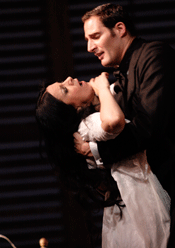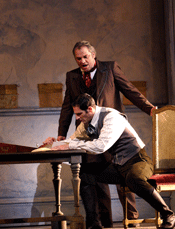![Angela Gheorghiu as Violetta Valéry [Photo by The Royal Opera/ Catherine Ashmore]](http://www.operatoday.com/Gheorghiu_Traviata_ROH_2010.gif)
09 Jul 2010
La Traviata, Royal Opera
This was my first Verdi performance in the theatre for thirteen years or so I must have been the least jaded of critics for the opening night of the revival of Sir Richard Eyre’s La Traviata.
English Touring Opera are delighted to announce a season of lyric monodramas to tour nationally from October to December. The season features music for solo singer and piano by Argento, Britten, Tippett and Shostakovich with a bold and inventive approach to making opera during social distancing.
This tenth of ten Live from London concerts was in fact a recorded live performance from California. It was no less enjoyable for that, and it was also uplifting to learn that this wasn’t in fact the ‘last’ LfL event that we will be able to enjoy, courtesy of VOCES8 and their fellow vocal ensembles (more below …).
Ever since Wigmore Hall announced their superb series of autumn concerts, all streamed live and available free of charge, I’d been looking forward to this song recital by Ian Bostridge and Imogen Cooper.
Although Stile Antico’s programme article for their Live from London recital introduced their selection from the many treasures of the English Renaissance in the context of the theological debates and upheavals of the Tudor and Elizabethan years, their performance was more evocative of private chamber music than of public liturgy.
Evidently, face masks don’t stifle appreciative “Bravo!”s. And, reducing audience numbers doesn’t lower the volume of such acclamations. For, the audience at Wigmore Hall gave soprano Elizabeth Llewellyn and pianist Simon Lepper a greatly deserved warm reception and hearty response following this lunchtime recital of late-Romantic song.
For this week’s Live from London vocal recital we moved from the home of VOCES8, St Anne and St Agnes in the City of London, to Kings Place, where The Sixteen - who have been associate artists at the venue for some time - presented a programme of music and words bound together by the theme of ‘reflection’.
'Such is your divine Disposation that both you excellently understand, and royally entertaine the Exercise of Musicke.’
‘And there was war in heaven: Michael and his angels fought against the dragon; and the dragon fought and his angels, And prevailed not; neither was their place found any more in heaven … that old serpent … Satan, which deceiveth the whole world: he was cast out into the earth, and his angels were cast out with him.’
There was never any doubt that the fifth of the twelve Met Stars Live in Concert broadcasts was going to be a palpably intense and vivid event, as well as a musically stunning and theatrically enervating experience.
‘Love’ was the theme for this Live from London performance by Apollo5. Given the complexity and diversity of that human emotion, and Apollo5’s reputation for versatility and diverse repertoire, ranging from Renaissance choral music to jazz, from contemporary classical works to popular song, it was no surprise that their programme spanned 500 years and several musical styles.
The Academy of St Martin in the Fields have titled their autumn series of eight concerts - which are taking place at 5pm and 7.30pm on two Saturdays each month at their home venue in Trafalgar Square, and being filmed for streaming the following Thursday - ‘re:connect’.
The London Symphony Orchestra opened their Autumn 2020 season with a homage to Oliver Knussen, who died at the age of 66 in July 2018. The programme traced a national musical lineage through the twentieth century, from Britten to Knussen, on to Mark-Anthony Turnage, and entwining the LSO and Rattle too.
With the Live from London digital vocal festival entering the second half of the series, the festival’s host, VOCES8, returned to their home at St Annes and St Agnes in the City of London to present a sequence of ‘Choral Dances’ - vocal music inspired by dance, embracing diverse genres from the Renaissance madrigal to swing jazz.
Just a few unison string wriggles from the opening of Mozart’s overture to Le nozze di Figaro are enough to make any opera-lover perch on the edge of their seat, in excited anticipation of the drama in music to come, so there could be no other curtain-raiser for this Gala Concert at the Royal Opera House, the latest instalment from ‘their House’ to ‘our houses’.
"Before the ending of the day, creator of all things, we pray that, with your accustomed mercy, you may watch over us."
The doors at The Metropolitan Opera will not open to live audiences until 2021 at the earliest, and the likelihood of normal operatic life resuming in cities around the world looks but a distant dream at present. But, while we may not be invited from our homes into the opera house for some time yet, with its free daily screenings of past productions and its pay-per-view Met Stars Live in Concert series, the Met continues to bring opera into our homes.
Music-making at this year’s Grange Festival Opera may have fallen silent in June and July, but the country house and extensive grounds of The Grange provided an ideal setting for a weekend of twelve specially conceived ‘promenade’ performances encompassing music and dance.
There’s a “slide of harmony” and “all the bones leave your body at that moment and you collapse to the floor, it’s so extraordinary.”
“Music for a while, shall all your cares beguile.”
The hum of bees rising from myriad scented blooms; gentle strains of birdsong; the cheerful chatter of picnickers beside a still lake; decorous thwacks of leather on willow; song and music floating through the warm evening air.
![Angela Gheorghiu as Violetta Valéry [Photo by The Royal Opera/ Catherine Ashmore]](http://www.operatoday.com/Gheorghiu_Traviata_ROH_2010.gif)
This was my first Verdi performance in the theatre for thirteen years or so I must have been the least jaded of critics for the opening night of the revival of Sir Richard Eyre’s La Traviata.
Benjamin Britten was said to listen to the music of Brahms once a year, to remind him why he loathed it. (Oddly, however, there is a recording of the op.52 Liebeslieder Waltzes from Aldeburgh.) In a similar spirit, although on a considerably broader timescale, I considered that it would do me no harm to put my prejudices or judgements to the test.
There would be many worse ways of doing so than seeing Angela Gheorghiu as Violetta. I had not actually heard her in the flesh before and was a little surprised as to how small her voice is. She made it work though, so that it could be heard perfectly well even when singing pianissimo. Her coloratura was, so far as I discerned, flawless, no mean feat. I recall watching this production on the television as a schoolboy, the first run under Solti which really made Gheorghiu’s name. She obviously does not look — or sound — so young now, but this remains still a fine vocal performance. In terms of playing herself on stage she is also clearly without peer; Angela Gheorghiu is a role one is tempted to think she was born to play. Certainly one had the impression, rightly or wrongly, that her movements, her expressions, pretty much everything she is doing — all these are very much her own thing.
 James Valenti as Alfredo Germont and Angela Gheorghiu as Violetta Valéry
James Valenti as Alfredo Germont and Angela Gheorghiu as Violetta Valéry
Given the conservatism of Eyre’s production, and especially of Bob
Crowley’s designs, that is not necessarily so bad thing. Zeffirelli with
a slightly lower calorie count doubtless appeals to some even on this side of
the Atlantic, but there is suspension of disbelief and then there is the size
of Violetta’s bedroom in act three of this production. Otherwise, the
costumes look beautiful and so forth, but it is really only the presence of the
soprano that grants any sense of theatre at all: ironic, since that then
reinforces the idea that opera should be about star singers and therefore about
works like this, and a vicious, doubtless highly commercial circle ensues. I
can only assume, moreover, that some deal had been struck with the Association
of Consumptives, for the state of the audience made poor Violetta seem hale and
healthy.
James Valenti looked good as Alfredo and sang ardently, but often wavered in intonation. There was strength in the singing of Željko Lučič as Germont père, though his stage presence was somewhat wooden (how much is the production at fault here?) and his style sounded just a touch incongruously Slavic. The choral singing was excellent, for which thanks must once again go to Renato Balsadonna and of course the Royal Opera Chorus itself. And the orchestra played beautifully, Yves Abel directing unobtrusively but not without character.
 James Valenti as Alfredo Germont and Željko Lučić as Giorgio Germont
James Valenti as Alfredo Germont and Željko Lučić as Giorgio Germont
There remains the work itself. I tried, but the esteem in which it and
Verdi’s œuvre in general are held continues to baffle me. Puccini
can be mawkish, Rossini can be shallow, but there is a degree of craftsmanship
to be heard and admired there. Verdi seems to combine the worst aspects of
both, standing perhaps slightly above Donizetti, but that is all. The
orchestration is often rudimentary — though, as I said, the orchestra
made the most of what it had. Harmony is uninteresting and the accompaniments
— the word for once is apt — are often so derisory. And then there
is the ‘tart with a heart, transfigured’ tale: does it go beyond
the level of a women’s magazine story? I fail to see how — and it
now seems utterly dated, not least in its attitude towards gender. Just when
one thinks there might be some psychological insight, the music of the pizza
parlour returns. The ‘tunes’, memorable because one hears them so
often, are rarely integrated into the musical texture, such as it is, let alone
into the drama, such as it is. Given the lack of musical interest, surely a
more adventurous production might alleviate the ennui.
Regietheater seems a necessity here. Were this a neglected work, one
could understand someone thinking it worth a try, but a staple of the
repertoire? Some people might, for a variety of reasons, dislike Wagner; but
being something other than Wagner is not in itself a guarantee of anything. As
Pierre Boulez once put it, Verdi is ‘picture-postcard music’. He
said that he would prefer to see a whole landscape; the same goes for me.
Mark Berry